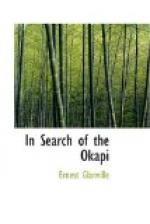The rug was brought, and the man nodded his head as it was arranged comfortably; then, with another long intent look at the hunter, he settled himself down with a sigh, spoke a word to his strange companion, which at once curled itself at his feet, and was asleep.
“Now, boys,” said Mr. Hume, “you go to bed. I will watch here, and in the morning, maybe, we will find out the mystery.”
In the morning the steamer was on the yellow waters of the Congo, and the boys forgot even about the strange couple in their first view of the mighty river; but the sight of a native-manned canoe, shooting out from the mist which hung in wisp over the waters, recalled the incident. They found Mr. Hume in an easy-chair, drinking his early morning cup of coffee, and at his feet, stretching along the scuppers, was the canoe, still with its crew aboard and asleep, though the jackal slept apparently with one eye open. The canoe was, they saw, made out of a single tree-trunk, and was thickly coated with the slime of the river, a heavy, sodden, roughly shaped craft, most unlike the light boat that skimmed into view from out the mist.
“What do you make of it?” said Mr. Hume, after the two boys had made a long inspection.
“It seems to me,” said Venning, “that the jackal has a very dark coat.”
“That is so; it is unusually dark. What does that suggest to you?”
“Well, as the colour is adapted to the nature of the country in which the animal hunts, I should say that the jackal came from a wooded district.”
“Good. And what is your opinion, Compton?”
Compton bent down to examine the bows. “Look here, sir,” he said; “there is a prayer to Allah carved in Arabic on a leaden medallion, and fixed into the wood.”
“Is that so?” and the hunter looked at the signs with interest. “I had not seen that. And it means——”
“That Arabs had something to do with the making of the canoe.”
“Umph! I doubt very much if it is Arab-built. That talisman may have been found by a native and fixed on—though that is impossible;” and Mr. Hume pondered. “The Arabs may have taken the canoe from the native owner and fixed in the medallion.”
“He’s awake,” said Venning; and the three of them saw that the man, without so much as a movement of surprise at his awakening under such altered circumstances, was keenly observing them.
After he had gravely inspected each in turn, he sat up and raised his hand in salutation. The rug slipped off his shoulders, showing his bare breast, with every rib exposed, and clearly outlined in blue was the form of an animal.
“A totem!” exclaimed the hunter.
“Otter,” said Venning.
“Ask the steward if he has the porridge ready that I ordered.”
Venning ran off, and returned with a basin of thick oatmeal porridge. The man took it gravely, made another salutation, and ate the whole.




